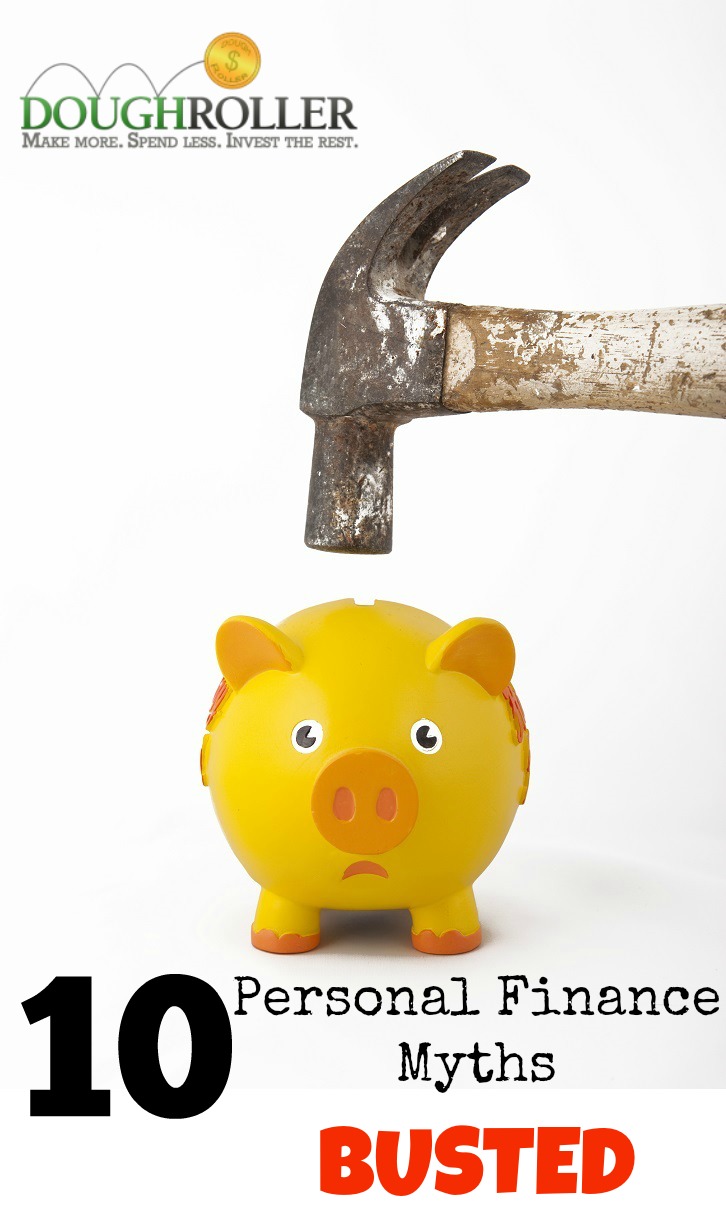10 Personal Finance Myths Busted
 If you spend any time reading about personal finance, you’ve no doubt encountered a ton of rules. Whether it’s that credit cards are evil or that school loans are ‘good’ debt, these rules all have their place. A problem arises, however, if you view these rules as inviolable. They’re not, and believing that they are can lead you down the wrong path.
If you spend any time reading about personal finance, you’ve no doubt encountered a ton of rules. Whether it’s that credit cards are evil or that school loans are ‘good’ debt, these rules all have their place. A problem arises, however, if you view these rules as inviolable. They’re not, and believing that they are can lead you down the wrong path.
Here are 10 of my favorite personal finance rules that are often meant to be broken:
1. You need a budget: No you don’t. A budget is not an end in itself. You don’t need a budget to feel like your are being financially responsible. And many people who track their spending don’t actually use the “budget” to control spending. A budget can be very helpful if used effectively. But far more important than a budget is spending and saving your money wisely. Many people do this without knowing how much they spend at Starbucks (I’m at Starbucks enjoying a Mocha while I type this!).
2. Passive investing requires index mutual funds: Most people equate passive investing with owning index funds. While this is certainly one approach, it’s not the only approach. In fact, you can be a well diversified passive investor by owning a dozen stocks or so by picking stocks across industries and countries. One might even argue that simply investing in Berkshire Hathaway can create a diversified portfolio. And investing in stocks is a lot less expensive than even index funds, which charge investors trading costs in addition to the expense ratio.
3. You need a lot of money to invest: You can get started with a 401(k) with just a few dollars a month. Betterment is another alternative that allows you to start investing with just $25 a month. And there are several other ways to invest when you have little money.
4. Credit scores don’t matter if you don’t borrow money: Credit scores are important for a lot of reasons. They can be a factor when you apply for a job, and they are a factor in determining your car insurance premiums. And because you can get your free credit score without a credit card, there’s really no excuse to ignore your score.
5. Credit cards are bad for your finances: Credit cards aren’t the problem; credit card debt is. Credit cards offer convenience, security and rewards. Some cards come with 0{6fac3e6a3582a964f494389deded51e5db8d7156c3a7415ff659d1ae7a1be33e} introductory rates on balance transfers and purchases. And the best rewards credit cards offer everything from cash back to free travel.
6. An emergency fund should equal expenses for six months: While there is nothing inherently wrong with this rule of thumb, that doesn’t mean it’s right for you. Every situation is different. For example, if you have high interest rate credit card debt, holding cash equal to six months of expenses in an emergency fund may be a costly decision. On the other hand, if your income varies from month to month significantly, you may need to save more than six months of expenses. So consider the rule of thumb, but then make the decision that’s best for you.
7. School loans are ‘good’ debt: ‘Good’ debt is debt used to buy something that goes up in value. A mortgage is a perfect example of ‘good’ debt. A car loan is ‘bad’ debt. With school loans, it’s not so clear cut. Borrow to get a liberal arts degree from an expensive private college, and you’re probably looking at very bad debt. Get an engineering degree from a public university and the degree will probably pay for itself many times over. The key is to recognize that not all college degrees are created equal. Some will pay for themselves; many will not.
8. You should always buy a used car: The last car I bought was used. The two before that were new. While you can save money buying a used car, the new versus used debate is not the most important consideration. A much more important factor is how long you keep the car. My wife and I bought a new, expensive car in 2002. We’ve owned it more than 13 years and have no plans to sell it. I suspect it will last at least another ten years, at which time we will have gotten a very good value for our money.
9. Budgeting is painful: Budgeting can be painful, but it doesn’t have to be. There are a lot of ways to make budgeting painless. For example, only track a couple of categories of expenses that give you trouble, rather than every dime you spend. And use an online budgeting tool. These tools are free and automate the budgeting process. A fairly new tool called Personal Capital is my favorite and one ideal for tracking spending and investments.
10. You should be debt-free before you invest: While I know this is the Dave Ramsey approach, it’s wrong for many people. If we had waited until we were debt-free to invest, our finances would have been a mess. For most people, the time to start investing is TODAY. Even if it’s just a few dollars a month, it’s a habit that you should develop early in life, even while you are tacking credit card or other debt.
What personal finance “rules” do you break?
The post 10 Personal Finance Myths Busted appeared first on The Dough Roller.
SOURCE: The Dough Roller – Read entire story here.